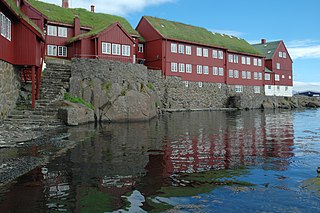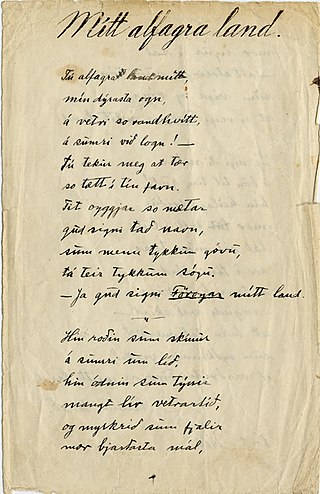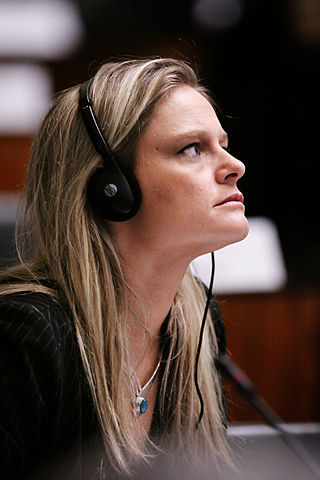
Tórshavn, usually locally referred to as simply Havn, is the capital and largest city of the Faroe Islands. It is located in the southern part on the east coast of Streymoy. To the northwest of the city lies the 347-meter-high (1,138 ft) mountain Húsareyn, and to the southwest, the 350-meter-high (1,150 ft) Kirkjubøreyn. They are separated by the Sandá River. The city itself has a population of 14,099 (2024), and the greater urban area has a population of 23,194, including the suburbs of Hoyvík and Argir.

"Tú alfagra land mítt", officially "Mítt alfagra land", is the national anthem of the Faroe Islands. It was written in 1906 by headteacher Símun av Skarði, and the melody was composed in 1907 by violinist Petur Alberg.

Katrin Ottarsdóttir is a Faroese movie director and author.

The Faroe Islands has a small population, and due to the high initial cost of filmmaking, the islands cinema history is modest. The first film director of the Faroe Islands was Katrin Ottarsdóttir. Her first film set in the Faroe Islands was Atlantic Rhapsody in 1989.
Uni Jógvanson Arge is a Faroese journalist, writer, musician, singer and a former international football striker.

The Faroe or Faeroe Islands, or simply the Faroes, are an archipelago in the North Atlantic Ocean and an autonomous territory of the Kingdom of Denmark. The official language of the country is Faroese, which is closely related to and partially mutually intelligible with Icelandic.

Juliane Elander Rasmussen is a Danish rower. She weighs 61 kilograms, and is therefore in the lightweight class. She lives in Copenhagen.
Bjørk Herup Olsen is a Faroese athlete. She is until now (2012) the best female middle and long distance runner in the Faroe Islands. Herup Olsen has won several Danish Junior Championships and holds several Faroese records. She was the first Faroese woman, who ran 3000 m under 10 minutes. Bjørk is running for the Faroese club Bragdið and for the Danish club Helsingør Idrætsforening . She signed her letter of intent to run track at East Carolina University.

Róðrarfelagið Knørrur is a Faroese rowing club in Tórshavn, which was founded on 28 February 1985. The club has its boat houses on Skálatrøð and Evensens pakkhús in Tórshavn. The boats compete in the rowing competitions which are held every summer around the islands. The row boats are blue with a white line around the top of the boat. All of the boats have names from the Faroese ballad Ormurin Langi. The boats of the row club has won several Faroese Championships. One of the former rowers of the club is Olympic rower Katrin Olsen, who became Faroese Champion with Róðrarfelagið Knørrur in 1997 and 1999, before she moved to Denmark. Later she became Danish champion in a different kind of rowing; in Denmark she was rowing in a lightweight double sculler. In 2008 she participated in the 2008 Summer Olympics together with Juliane Rasmussen, they ended up as number seven in the Women's lightweight double sculls. The Faroese word for boat race or rowing competition is Kappróður.

Jón Pauli Olsen is a former manager for the Faroe Islands women's national football team. He was also manager for the Faroe Islands Women's U17 national team. Olsen is also a former football player, he mostly played as a forward, but sometimes he played as a midfielder and sometimes as a defender. He is married to Sirið Stenberg, who is member of the Faroese parliament (Løgting).
Marjun Syderbø Kjelnæs is a Faroese poet, playwright and novelist.
Ebba Hentze was a Faroese writer of children's books and a poet and translator.

Annika Olsen is a Faroese politician, high school teacher and former swimmer. She was Deputy Prime Minister and Minister of Social Affairs in the Faroe Islands (2011–15) and Minister of Internal Affairs from 2008 to 2011 representing the People's Party. Before that she was a member of the City Council of Tórshavn from 2004 to 2008. Annika Olsen has an MA in Nordic languages and literature with a supplementary subject in religion. She is the daughter of Jákup Olsen, a businessman, former politician and former headmaster of Vágur's School and Marna Olsen, born Holm, a retired teacher.

The levels of education in the Faroe Islands are primary, secondary and higher education. Most institutions are funded by the state; there are few private schools in the country. Education is compulsory for 9 years between the ages of 7 and 16.

Sverri Sandberg Nielsen is a Faroese rower who competes for Danske Studenters Roklub and Denmark in the heavyweight single sculls. He also competes in indoor rowing and has set a new Danish record three years in a row, 2015, 2016 and 2017 and again in 2019 and 2020. In 2019 he won silver medal at the World Rowing Championships. In 2020 he won the European Rowing Championship and the following year he won silver at the same event. In 2021 he competed for Denmark at the 2020 Summer Olympics. He also competes for Denmark at the 2024 Summer Olympics.
Georg Lindenskov Samuelsen was a Faroese editor.

Knút Wang was a Faroese journalist and politician for the People's Party.
The Faroese Confederation of Sports & Olympic Committee is the highest authority for sporting activity in the Faroe Islands. It oversees 24 sports associations and over 100 sports clubs for a population of 51,312.
The COVID-19 pandemic was confirmed to have reached the Faroe Islands, an autonomous territory of Denmark, in March 2020. The confirmed infection rate was 1 case per 280 inhabitants, one of the highest rates in the world, but the archipelago also tested at a very high frequency, with the number of tests equaling c. 34 per cent of the population. As of 28 February 2022, there have been 34648 confirmed cases. Among these, 31 persons have died with COVID-19.













